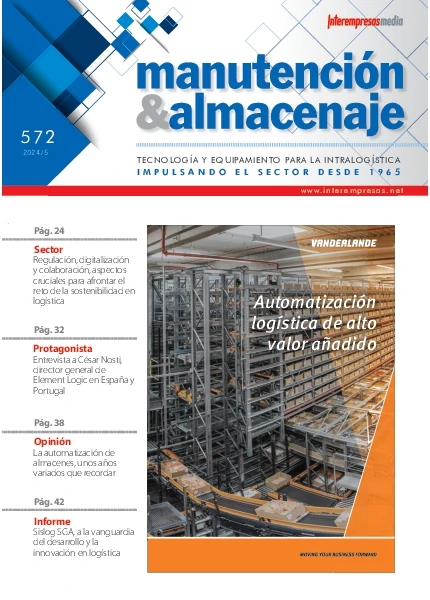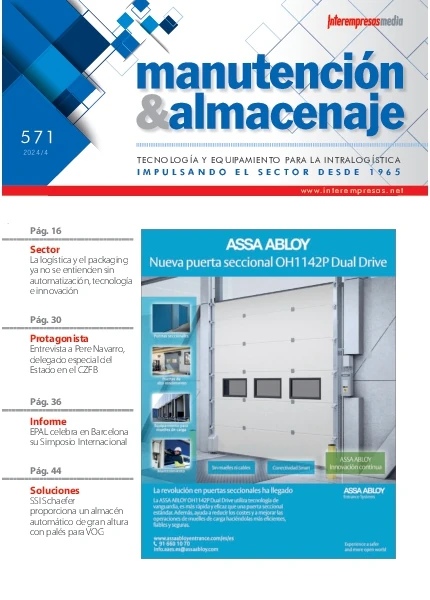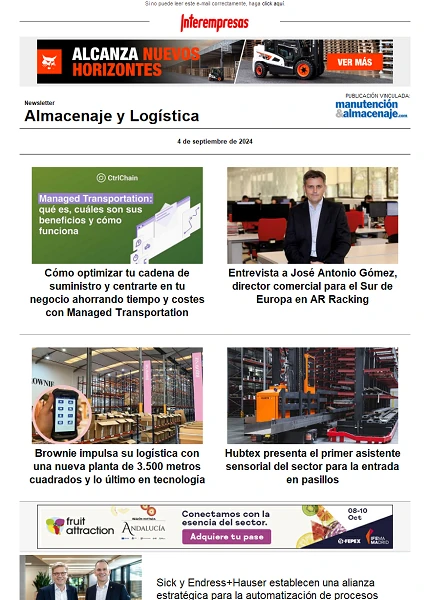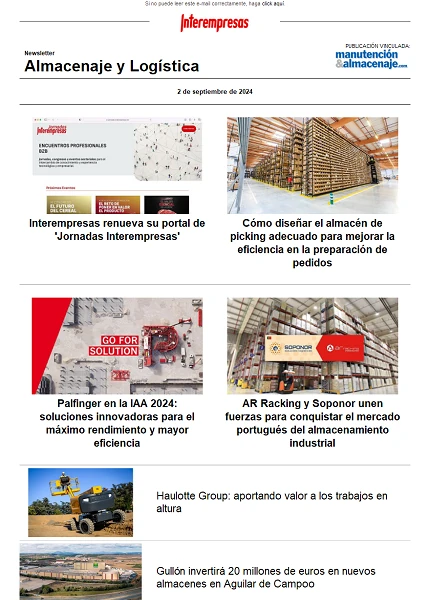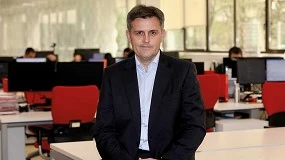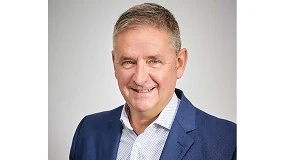The logistics industry is in crisis but believes needed better planning
December 17, 2009
The direction of the V Edition of the ICIL Debates can be satisfied. The call was a success for assistance and many were the conclusions that were obtained from the four raised tables. In the framework of the London room of the Municipal Palace of congresses and exhibitions of Madrid (Ifema), speakers and attendees, they emphasized the strengths and weaknesses of a sector that has experienced a great progression in the last 5 years.
In this sense, the President of the Executive Committee of the Foundation ICIL, Pere rock, highlighted the conclusions this year have been able to draw from the discussions. The first and more clear of all of them is that "Spain will be the logistical platform in southern Europe only if we are competitive, are specialized infrastructure and agents". He also explained that carrying out a national logistic Plan is complicated because the powers are transferred to the autonomous communities and that "the train is still a solution for the future, but not yet appropriate measures have been planned".
It is for this reason that the customers of logistics platforms require efficiency in cost and the services offered. Rock also predicted that the transport companies will suffer a "catastrophic scenario", after which the logistics operators will concentrate and will specialize. Other conclusions that Pere rock pulled out of the discussions was that automation and a robotization of the sector in a flexible manner need: "If we divvy up the risk and benefits are opts better to new technology projects, which is also accessible for SMEs"He said. In this sense he also stressed that technology investments must be raised in small projects that are necessary for each organization, which allows to shorten the time and optimize the ROI.
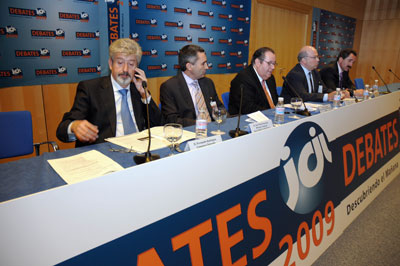
As for the models of relocation, the President of the Executive Committee of the ICIL Foundation explained that the 2009 discussions highlighted three variables: the product, the country and the market. It is for this reason that a survey prior to any decision to relocate is essential. Finally, Pere rock noted that need a global vision of the logistics and their costs and have a special sensitivity in human resource management.
The four discussion panels
The first of the discussion panels had a clear objective: reel off what logistical structures are more priority for economic development. In her interventions were made by the Manager of CITET Eduardo Zapata, director National Industrial Agency and logistics Richard Ellis, Basil González, director of logistics of the consultant Prointec Javier Fernández, the director-general of Cimalsa, Ignasi Regás, Deputy Manager of Madrid platform logistics Gonzalo Romerothe managing director of Abertis Logística, Joan Font, CEO of Setram Daniel Tarragona, the director-general of Ceva Logistics Giuseppe Chelito and the director of 'Business and development' of Azkar, Francisco Castillo.
Luis e. Domenech, director of training of the ICIL Foundation, was the moderator of the General Committee, which was released as conclusions that Spain is not the logistics platform in southern Europe due to its lack of competitiveness in infrastructure planning, price and services. In this sense, Eduardo Zapata stressed that "the logistics backbone the economy." There is no movement of goods without logistics, there is no export, or importance, no there is consumption, therefore. "We need an efficient logistics for the development of the country." Javier Fernández for his part said that "Spain has a very important geostrategic location." "We must be logistics but at the same time perform a series of efforts by planning to have a competitive advantage."
Gonzalo Romero, Deputy Manager of Madrid platform logistics, explained the community of Madrid has plans to "promote a series of active policies such as the Plan of logistics infrastructure, a major project of public and private collaboration that is going to run in the next few years", although not reflected any of those policies. Joan Font instead stressed that "logistics is not only going to solve a country's progress, but a set of elements, such as production, services and consumption". Daniel Tarragona opted to comment that "we are working in the automotive sector and logistics is paramount here." "I.e., logistics is to trade, what the money into the economy". Francisco Castillo x on the subject by saying that "more than logistics, I think that it is a priority to increase exports at this time".
Madrid, Catalonia and the train
Another issue raised by Luis e. Domenech was "Madrid and Catalonia can work logistically together?". This question, with the historic rivalry between the two capitals, was answered by Gonzalo Romero, who said: "the desirable is that you work in joint and coordinated manner." MPL is an example of this with the participation of public and private administrations. "At the same time, it must also respect the singularities of all the autonomous communities". Ignasi Regás, CEO, Cimalsa, was not so in favour, stating that "the territories compete with all around the world." Countries, regions, cities. Infrastructures are planned and executed. From here the public authorities are cooperating, and the rest compete. But it is reasonable that the Spanish ports rates set them the BOE? This is not reasonable. "The ports should compete and thus each can specialize."
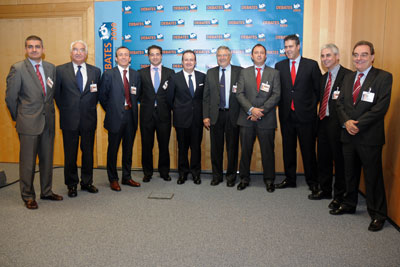
As for the future of the train in the logistics market, which currently is only 3.9% of market share, Ignasi Regás complained that "in the last 50 years no one in Spain grey matter has been dedicated to the carriage of goods by train and has not invested." "The current Minister of public works has spoken of a Plan of carriage of goods, and for the first time, there are people studying this." Daniel Tarragona, Managing Director of Setram, confirmed this by saying that "the same thing he has done with the bird for passengers, must be done for the goods." Major investments and a quality service. So far the only thing that has happened is hinder the road, thinking that the traffic would go to the railway. "This has not happened".
Focusing on this issue, Eduardo Zapata, Manager of CITET, stated that "there it is always to find the most efficient and flexible." In logistics, the most efficient is road transport. Truck manufacturers are investing large amounts to pollute less, to have the latest information technologies to optimize routes, etc. But, for what have built certain logistics centres in the middle of nowhere? "."
Is there really a crisis in the logistics industry?
The second table debate, less busy and entertaining that the previous one, attended by Fernando Rodríguez, Vice-President of Seur, José María Serrano, general director of Salvesen logistics, Alfonso Cualladó, CEO of One to One, and Heliano Madrigaldirector of logistics of Schweppes. The main conclusion to be drawn from this meeting is that the Spanish logistics industry is not in crisis and will have a period of expansion because of increased outsourcing of companies and the boom in e-commerce.
The moderator, Félix Tobalina, President of the Association ICIL, raised two questions to the participants in the debate. In the first, wondered if a restructuring of the logistics industry is necessary and if it is in crisis. To do this, Fernando Rodriguez responded that "logistics in Spain is not in crisis." But I rectifier. The pure transport is a decrease of 40%, the parcel in a decrease of 20%. And logistics has fallen by 15%. "There are 200 logistics operators in Spain and one will grow its turnover by 12% this year."
Also made clear that "logistics is in a position of privilege within the current economic situation." "The majority of clients will ask comprehensive, political solutions of open books and search for synergies in innovation". In addition, he explained that "the client is going to be much more demanding." We must take into account a fact: 66% of companies in Europe is reassessing the entire supply chain. This means a new logistic phase. "Moreover, the degree of outsourcing of companies will increase from 23% to 30% in Europe."
Alfonso Cualladó for its part was of the view that "from the point of view of a logistics operator we consider the crisis as a retraction in the billing." "Spanish logistic sector does not need restructuring, but the trucking Yes". Heliano Madrigal, director of logistics of Schweppes, gave his point of view as a client: "For me, the crisis in the logistics, as a customer, was given in the summer of 2006 when it was not my product transport on certain routes." Now, in 2009 I'm happy because I have more offers never and not me missing the transport. "In any case the movements in the logistics operators is expected which is a concentration and this worries me, because when an operator increases in size usually lose sight of the customer".
José María Serrano, Salvesen logistics, stressed: "the proactivity of the logistics operators is essential in solutions and costs." "Just as the fire go out in winter, we must now make self-criticism to level macro and micro".
The logistics stage post-crisis
The second of the issues raised by the moderator was "the companies that survive the crisis what actions should be done to recover?". Alfonso Cualladó reflected on this stating that "the investment in technology is which brings differential and added value." Training, both for logistics operators, such as for clients, and thus speak the same language in the negotiations. Because cost reduction is should not be based exclusively on the decline in prices. "The logistics operator must provide alternatives to its client, new methodologies or groupings, for example".
José María Serrano was not very optimistic and predicted that "after the crisis there will be a 'boom'." "On the other hand, many of the current managers of companies only have developed its activities in positive junctures of growth". It also showed his disagreement with the opinion of Cualladó stating that "to prepare it is necessary to search for models of competitiveness with medium and long term horizons." "What differentiates the operators logistics are people, not the technological means". Fernando Rodríguez opted another way to say that "the great risk that the logistics sector is their profitability." In 2007 the overall profitability was 1%. This room requires to be bouncer. "This is the great challenge, we must change this trend."
Automation, key process for flexibility
After the break to eat, the third table of debate began with the theme of the mechanization of services in the spotlight. The Bureau was formed by Veronica Pascual, general director of Asti, Cesar Briones, Manager of Viastore Spain, Helena Hueto, 'country manager' for Spain & Savoye Logistics Portugal, Mariano Sanz, director of Eulen logistics services, Pedro Luís of las Heras, director of Information Systems & Information for Iberia of Ceva Logistics, and Ramón de Cozar Mena, head of technology consulting of Telvent Global Services. The moderator of the General Committee, Richard Catelli, director of innovation and logistics support to companies in the ICIL Foundation, among other issues asked: "What competitive factors provides the robotization?".
For starters, Helena Hueto wanted to differentiate: "the value of a mechanical system is her provides the intelligence behind, i.e. the system of information." In many companies there is fascination by the technique shown in exhibitions. "This is not automate". Ramón de Cozar Mena was more theorist claiming that "the competitive values of the robotization are: efficiency, quality, productivity, agility and flexibility". Cesar Briones, for its part, wanted to highlight the negative part of the automations: "Return on investment." If I have to do a 100,000 pallet store, can do you manual, roboticized or a mixed solution. It is possible that the investment of the automatic solution was the bottom, with a negative ROI. "The key is to focus on the important processes before making a decision."
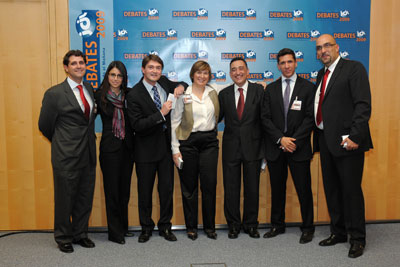
As regards SMEs, attendees were asked if they can automate and robotizar or is only a matter of volume. Veronica Pascual, general director of Asti, was of the view that "it is not about volume." "It's automating with head, to risk-sharing, to obtain a standardized process of quality". Ramón de Cozar Mena confirmed this theory by saying that "the volume is not decisive." "Small processes are those who pay less attention and are likely to be improved."
Risks of offshoring
The last of the discussion panels had the participation of Maurice Graessner, Logistics Market Manager of Electrolux, Josu Calvo Moreira, director general of operations, management and Control of Gonvarri, Mario neighborhood, SCM of Ficosa international, Augustine Idareta, director of logistics of TRW Automotive Spain, Mikel Etayo Sodupe, director of purchasing and logistics Rothenberger, Ms. Baldazo, 'supply chain coordinator' irizar, José Antonio Vozmediano, national director of logistics of the Eurobanán group, and Fernando Gil Torné, director-general of Management Expertise. Jaime Mira, technical director of the ICIL Foundation, raised, among others, the following question: "What happens in the business strategy of the redeslocalización?".
Fernando Gil Torné described the current scene explaining that "the multinationals have very clear why they want to relocate to produce low-cost countries." SMEs do so because they are following customers. "They are captive relocation." Josu Calvo Moreira, Gonvarri, provided the following view: "Four or five years ago, in some sectors should be global." This has changed. Gonvarri is a supplier of the automotive sector and offshoring has nothing to do with materials or more cheaply. The provider is going with the manufacturer to relocate. "But this process is terribly complex." José Antonio Vozmediano explained that "when referring to the crisis in the logistics industry, I think that we have been all my life, because to the logistics always asked us to save, more and more". Agustín Idareta believes that "it is not easy to relocate." You have to take this decision very contentedly and numbers in the short and medium term. All risks, environments, market. The more intense and deep. Once taken the decision we have to have plans of contingency and from there set up. "Relocate never can be by fashion, but sense and discretion".
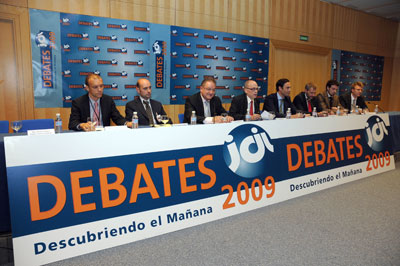
Mikel Etayo Sodupe was somewhat disappointed to say: "Have been 40 years without learning." We have not and we know where we are. In the early 1980s, the relocation of European companies we received on our territory and not learned. Now, in the century XXI are Chinese and we still do not learn. And this does not stop. Bugs go to China or India is that we went with everything, no strategy, and begin to engage in numerous unforeseen costs: customs tariffs, failures in the supply chain, etc. "." Maurice Graessner, for its part, was very in favor of globalization "it has no turning back". The logistics have a duty to prepare companies to new strategies in response to changes in the market. "Find appropriate professionals, the international knowledge and discover the best opportunities". In conclusion, Ms. Baldazo, wanted to emphasize that "we have the idea that buying in countries 'low cost' is cheaper, but must be assessed the logistical cost of bringing it to Spain, and sometimes are not interested." "The best thing is thinking in supply chains extensive, from the supplier's supplier to the client with a global concept, flexibility and level of service."
Outstanding statements
- Javier Fernández, director of logistics of the Prointec consultant: "Can not have 28 generalists ports doing all the same." "The Spanish ports should specialize in traffic".
- Giuseppe Chelino, CEO of Ceva Logistics: "Spain must change its model of price." Install a warehouse in Barcelona is 70% more expensive than in Rotterdam, twice in Paris and 50% more than in Milan. "These data are from the European Industrial Property Market."
- Basil González, national director of agency Industrial and logistics CB Richard Ellis: "In Spain regional initiatives often compete and are not inclusive." "We need a national logistics Plan and define our role in Europe."
- Ignasi Regás, CEO of Cimalsa: "Is reasonable Spanish ports rates are fixed by the BOE?." This is not reasonable. "The ports should compete and thus each can specialize."
- Daniel Tarragona, Managing Director of Setram: "between the port of Barcelona and the port of Tarragona have shown interest in ally, but there is no way." "If two ports that are less than 100 kilometers are not in agreement, harder it will be among other more distant ports".
- Fernando Rodriguez, Vice President of Seur: "the client will be much more demanding." We must take into account a fact: 66% of companies in Europe is reassessing the entire supply chain. "This means a new logistics phase in which we must increase profitability."
- Heliano Madrigal, director of logistics of Schweppes: "As for the movements in the logistics operators, it is foreseeable that a concentration and this worries me, because when an operator increases in size usually lose sight of the customer".
- José María Serrano, general director of Salvesen logistics: "To prepare the future it is necessary to search for models of competitiveness of medium and long term horizons." "What differentiates the operators logistics are people, not the technological means".
- Mariano Sanz, director of Eulen logistic services: "For my part, I fought the technological mercenaries." When you are selling a machine I tell them that not at a price fixed. I try that so they sold me by movement, by operation. This is a good system, if I win, you win. "Although logically it should guarantee a minimum".
- Helena Hueto, 'Country Manager' for Spain & Savoye Logistics Portugal: "sometimes the most convenient are not comprehensive automation of processes, but in specific areas." In a matter of equipment sold, above all, when sees the potential client running on an installation. "It is essential to keep happy customers with the appropriate Automation".
- Pedro Luis de las Heras, director of Information Systems & Information for Ceva Logistics Iberia: "Automate seeks to increase the productivity, efficiency, value to customers, ultimately, making the company more competitive." "The process reengineering has to do every day, because the market changes on a daily basis."
- José Antonio Vozmediano, national director of logistics of the Eurobanán group: "We talk about cost and efficiency in relocations, but we also need to refer to the added value that we are taking." In any case, the exploration of field with local people is essential. "The opposite is a certain failure."
- Ms. Baldazo, Supply Chain Coordinator of Irizar: "the best is to think in large supply chains, from the supplier's supplier to the client with a global concept, flexibility and level of service".


